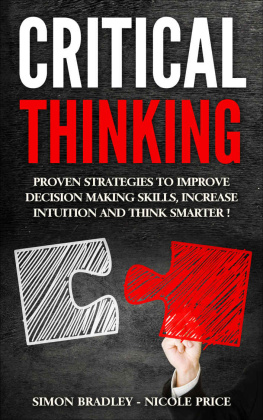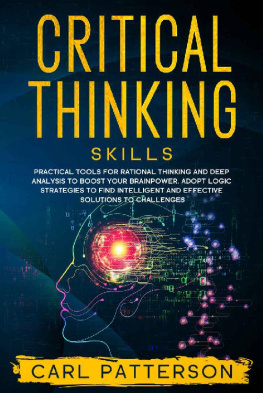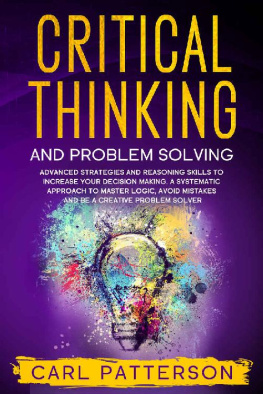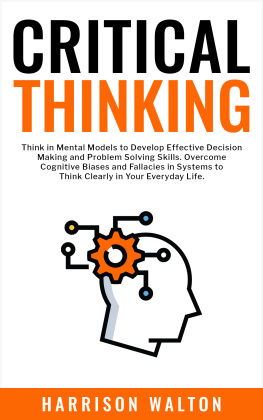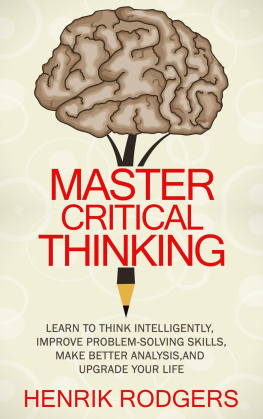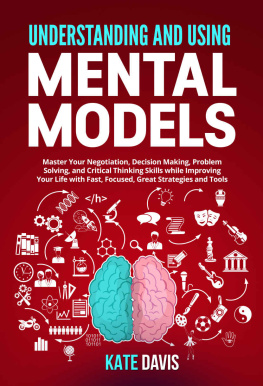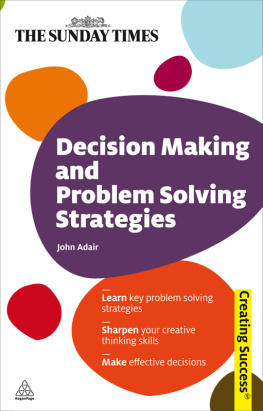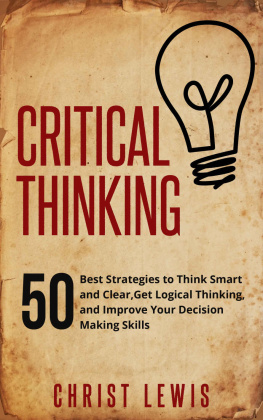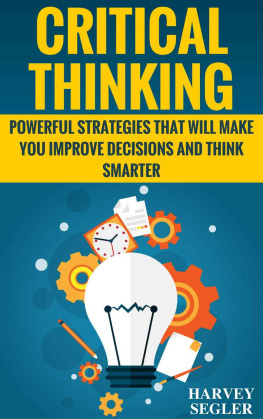CRITICAL THINKING
Proven Strategies To Improve Decision Making Skills, Increase Intuition And Think Smarter!
Simon Bradley & Nicole Price

2016 Copyright.
Text copyright reserved by
Simon Bradley & Nicole Price
The contents of this book may not be reproduced, duplicated or transmitted without direct written permission from the authors
Disclaimer: all attempts have been made by the author to provide factual and accurate content. No responsibility will be taken by the authors for any damages caused by misuse of the content described in this book. The content of this book has been derived from various sources. Please consult a licensed professional before attempting any techniques outlined in this book.
Table of Contents
Introduction
Chapter 1: Understanding Critical Thinking
Chapter 2: Historical Details of Critical Thinking
Chapter 3: Thinkers who Fashioned Critical Thinking of Their Time
Chapter 4: Skills and Procedure
Chapter 5: Inductive and Deductive Reasoning
Chapter 6: Reason to Adopt Critical Thinking
Chapter 7: Difference between Reading and Thinking
Chapter 8: How Critical Thinking Solves Problems
Chapter 9: - Get Logical Thinking
Chapter 10: - Improve Your Decision-Making Skills
Chapter 11: How to Make Better Decisions
Chapter 12: Strategies to Help Improve Critical Thinking
Chapter 13: - Group Decision-Making Skills
Chapter 14: Applying Questions in Critical Thinking
Chapter 15: Exercising the Brain
Conclusion
Introduction
Your brain is a three-pound supercomputer that is the command center for your body and your life. Its involved in every aspect of what you do in your life, as well as every bodily function. It determines your thoughts, your feelings, your actions and your social disposition. Your brain regulates the kind of person you are. It controls how thoughtful you are, how polite or rude you are, how well you think in a dangerous situation and how you behave around your colleagues and family. It influences your emotional well being and how well you perform with the opposite sex. Your brain is literally involved in everything about your life.
Its more complicated than any computer that has ever been created or have even imagined. It has one hundred billion nerve cells in it, and all of those nerve endings have connections with other cells. Your brain has more connections in it than the amount of stars in the universe. If you want to be the best person you can be at work, in a relationship or even when performing leisure activities, you need to optimize your brains functioning!
Many of us exercise, lift weights, eat healthy and do yoga in order to keep our bodies in good condition, but what about the brain? Your brain is the epicenter of your life, and houses the computer that helps you to make every decision that touches your life. Chances are, were just ignoring it and hoping that it will do its job without further input from you.
No matter how old you are, mental exercise will have a positive effect on your brain, which will, in turn, have a positive effect on your life. Besides, your brain needs to be fundamentally healthy to be able to go through the process of critical thinking, which is the basis for many problem-solving initiatives. The critical thinking discussed in this book encompasses smart strategies, logical thinking as well as great decision making skills. All these call for high level reasoning from a brain in tip top shape.
So lets discuss how you can exercise your brain and make yourself into a logical thinker, as well as improving your decision-making skills.
Chapter 1: Understanding Critical Thinking
Is it all right to say that critical thinking is what plain thinking is not? Well, possibly so. In critical thinking, you begin to evaluate something the minute you hear it; that is before deciding whether to believe it or not. Actually what you begin with is analyzing all the parts of what has been said and then assessing each of them in the context within which it has been uttered. After consolidating everything that you come up with, whatever you make of the intended meaning, as a whole, is bound to be objective.
For you to be efficient in critical thinking, you need to know how to structure the entire process. The following points can help:
- Make a deliberate effort to single out the ideas contained in the piece of information you are analyzing
- Weigh the ideas you find against each other to try and see what their correlation is.
- Find out the relevance and importance, if any, of each of your ideas.
- Pick out the arguments involved in the situation you are assessing and see how weighty or flimsy they are.
- After evaluating the arguments that you find, create your own arguments to demonstrate how many of the ideas that were presented were ideas that you agree with and which of the arguments go against what you believe in.
- Identify any inconsistencies contained in the text or arguments during your analysis. You also need to be on the lookout for any glaring mistakes in the arguments presented.
- Think up solutions that can rectify any shortcomings that you find.
- As you do your analysis and construct your counter arguments, you want to bring your personal values into play.
One important thing that needs to be said at this juncture is that, as a critical thinker, you can only argue from a point of knowledge. Your arguments should be distinguishable from those of people who get their information from the grapevine or try to rely upon conjecture. That is why you need to have your facts correct from the very beginning.
In addition, you need to have a relatively clear mind about the sequence of events and even know how to organize the facts you have in a logical manner. A critical thinker, therefore, has a great body of knowledge to tap into as well as the competence to analyze issues and make sense out of the information. Of great importance as a critical thinker is the ability to put facts in their proper perspective. That way, your work becomes a tool to be used for a higher cause or improvement.
What do you accomplish by critical thinking?
- Highlighting any unfounded arguments that you can detect
- Highlighting any fallacies contained in the arguments presented
- Introducing or strengthening objective reasoning
- Strengthening existing good arguments with your knowledge and logic
- Contributing positively towards tasks that are constructive
- Contributing to improvement of theories that are already in use
- Improvement of working processes
- Improvement and strengthening of institutions
In short, critical thinking is handy wherever knowledge, objectivity and analytical skills are necessary.
Critics say critical thinking is a hindrance to creativity true or false?
False! If you believe this premise, you would be implying that creative people are basically illogical and, yes shallow as well. Yet that is far from the truth. Creative people are vastly informed. And they are often critical and not always as carefree as you may imagine, but they can also be spontaneous. How else do you think they set about improving their work if not on the basis of critical thinking?
In short, critical thinking does not prevent you from being creative. In fact, you often dont understand about thinking outside of the box unless you have already understood the ins and outs of a regular response. Usually after a session of critical thinking youll able to see what the out of the box response would involve because you have likely exhausted other avenues through critical thinking.

